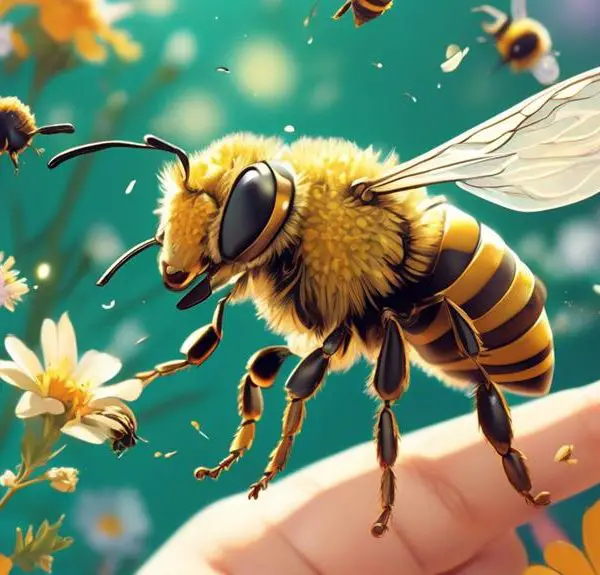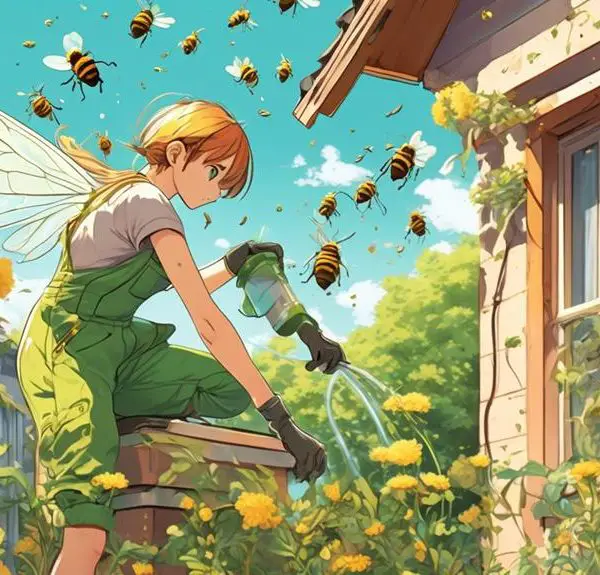Buzz into the intriguing story of how the Sweat Bee earned its unique name, uncovering the unusual attraction behind its moniker.

How Did the Sweat Bee Get Its Name
Just as a rose by any other name would smell as sweet, the sweat bee, irrespective of its nomenclature, has a fascinating allure that's worth exploring.
You might wonder why such a small insect bears the peculiar name of 'sweat bee.' It's not like they're known for their intense workout regimen or anything of the sort. In fact, their name has little to do with their habits or lifestyle and more to do with their peculiar attraction.
Yet, don't be too quick to assume you know the whole story. There's more to this name than meets the eye, and as we peel back the layers of this mystery, you'll discover a surprising world hidden beneath the surface.
Key Takeaways
- Sweat bees are also known as Halictidae and are named sweat bees because they are attracted to human sweat.
- Sweat bees are attracted to human sweat because of the salts and electrolytes present, which they need for their survival.
- Sweat bees are not aggressive by nature and will only sting if threatened, and their sting is less painful compared to other bees.
- Sweat bees are important pollinators and play a vital role in maintaining biodiversity and agricultural productivity.
Unveiling the Sweat Bee's Name
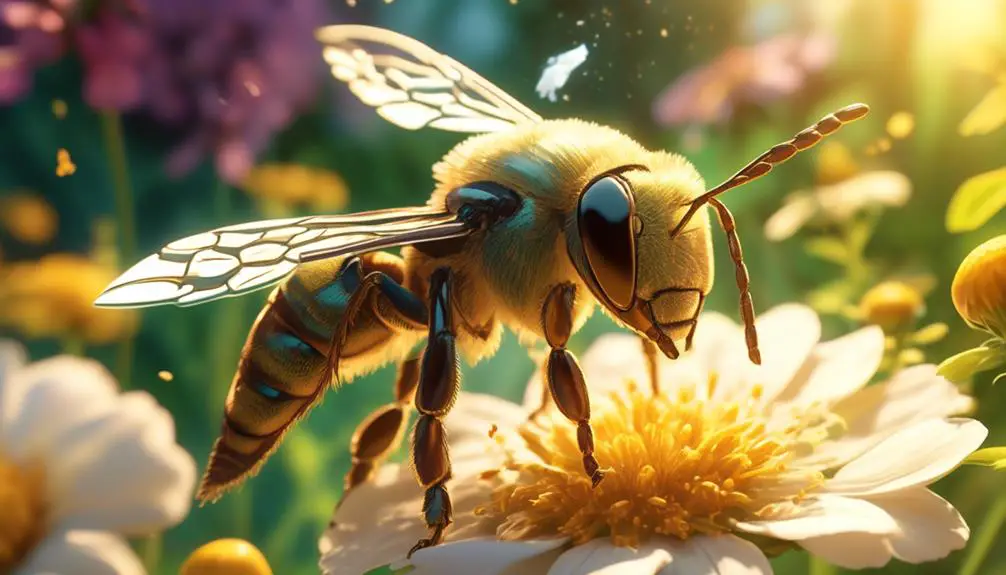
You might be wondering how the sweat bee earned its peculiar name. Well, it's not as strange as it sounds. Sweat bees, also known as Halictidae, are so named because they're attracted to human sweat. It's not that they've an odd affinity for your perspiration. What's happening is that these bees are after the salt in your sweat. They need it for their nutrition, and your sweat happens to be a convenient source.
Now, don't let this put you off. Sweat bees aren't aggressive by nature. They'll only sting if they feel threatened. And their sting is much less painful compared to other bees.
Despite their attraction to sweat, they're still pollinators. They play an important role in the ecosystem, helping plants to reproduce by transferring pollen from one flower to another.
Sweat Bee's Unique Attraction
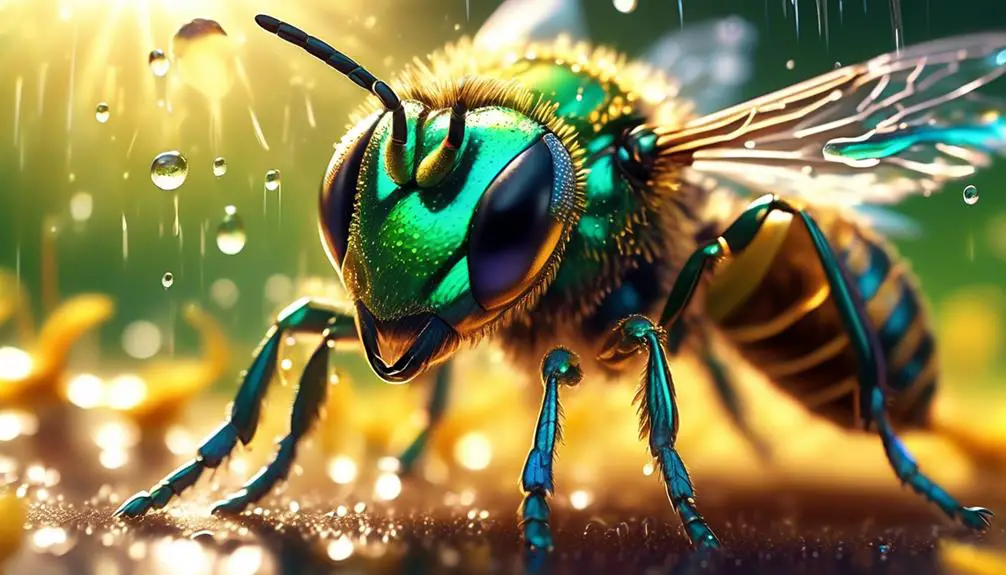
Ever wonder why sweat bees find your perspiration so enticing? It's because of the salts and electrolytes present in human sweat. These tiny creatures are actually attracted to the sodium in your sweat, which they need for their survival.
You see, sweat bees, like many other insects, require certain nutrients to thrive. Sodium is one such nutrient. It plays a crucial role in their physiological processes, such as nerve function and maintaining body fluid balance. They aren't able to get enough of this vital nutrient from plant nectar alone, so they're drawn to another source – your sweat.
But don't be alarmed. While it might be a bit unsettling to find these bees hovering around you after a workout, they're generally harmless. They only sting when threatened or squashed. And, unlike some bees, sweat bees aren't aggressive. In fact, they're actually quite beneficial for the environment, as they're excellent pollinators.
Historical Background of Sweat Bees

Delving into the historical background of sweat bees, we'll find that these fascinating insects have been buzzing around, attracting curious minds for centuries. You'll be amazed to learn that their existence can be traced back over 120 million years to the early Cretaceous period. They're part of the Halictidae family, which is one of the largest families in the bee world. But don't be fooled by their size; they're tiny, yet their impact on the ecosystem has been colossal.
It's important to note that sweat bees weren't always named such. It was only when people noticed their peculiar attraction to human sweat that they were aptly named 'sweat bees'. You see, the saltiness of human sweat is irresistible to these bees and they'd often land on perspiring humans to quench their thirst.
Throughout history, sweat bees have been a symbol of industriousness and hard work, revered in many cultures. They were even considered sacred in ancient Egypt! Today, they're recognized for their vital role in pollination. So, next time you see a sweat bee, remember, they've been around longer than most insects, playing a crucial role in our ecosystem.
The Sweat Bee's Behavior Overview
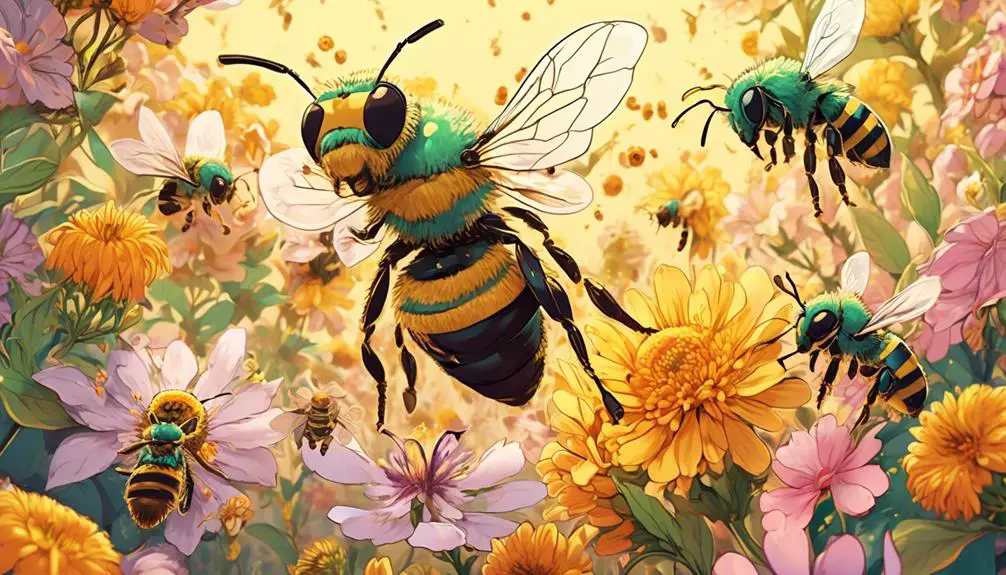
Now, let's turn our attention from their historical background to an understanding of the sweat bee's behavior. You might find it surprising how these small insects have such fascinating habits.
Firstly, sweat bees are known for their attraction to perspiration, hence their name. They're attracted to the salts in your sweat, but don't worry, they're generally harmless unless provoked.
Secondly, these bees are solitary creatures. Unlike honeybees, they don't live in large colonies. Each female sweat bee digs her own underground nest where she lays her eggs.
Lastly, they're important pollinators. Despite their small size, sweat bees play a crucial role in the ecosystem by helping to pollinate plants.
- Attraction to Sweat: This may make you apprehensive, but remember, their intention isn't to harm you, but to gain access to salts.
- Solitary Nature: This might make you feel sympathetic towards these lone bees, each female tirelessly working to ensure the survival of her offspring.
- Pollination: Recognize the critical role they play in our ecosystem. This should evoke a sense of gratitude and respect for these tiny workers.
Understanding their behavior not only helps dispel any fears you may have, but also fosters appreciation for these often overlooked creatures.
Impact on Ecosystem and Agriculture

You mightn't realize it, but sweat bees significantly impact our ecosystem and agriculture, playing a vital role that's often underestimated. As prolific pollinators, they're essential for maintaining biodiversity. They help in the reproduction of many wild plants by transferring pollen, thereby ensuring the survival of different plant species.
Sweat bees are also a boon to agriculture. They're responsible for pollinating many crops like blueberries, onions, and sunflowers. Without them, you'd see a drastic decrease in the yields of these crops. This could lead to increased food prices and scarcity. It's not an exaggeration to say that sweat bees are a farmer's best friend.
Yet, these tiny heroes face threats, including habitat loss and pesticides. As their numbers dwindle, so does our planet's biodiversity and agricultural productivity. So, it's crucial that you do your part in their conservation. Plant native flowers, avoid using pesticides, and leave some bare soil in your yard for them to nest in.
Conclusion
So, there you have it! Sweat bees got their name from their uncanny attraction to human sweat. It's a quirky, historical fact that adds a bit more charm to these tiny creatures.
But remember, they're more than just sweat-lovers. They're essential pollinators, playing a crucial role in our ecosystems and agriculture.
So, next time you see a sweat bee, give it a nod of respect for its hard work!

